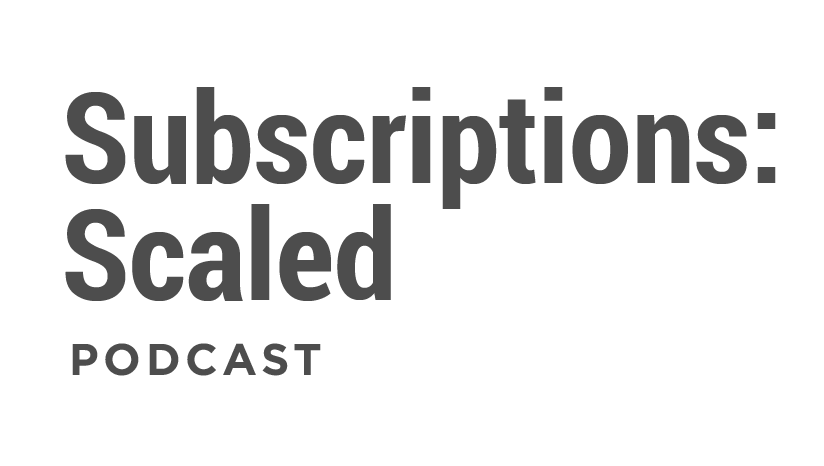Episode 82: Podcast Hosting with Craig Hewitt, Founder and CEO at Castos
In this week’s episode of Subscriptions Scaled, we speak with Craig Hewitt, Founder and CEO of Castos. Castos is a podcast hosting platform for creators, providing subscribers with tools to engage their audience and monetize their content.
In the episode, we learn about Castos and how it works, along with information about Craig’s background and career journey.
Keep reading to learn all about the episode.
Castos
Castos has been in the business for nearly six years. Its predecessor was PodcastMotor, which was rolled into the Castos umbrella.
Craig Hewitt
Craig has been in the podcasting business and working with subscription-based revenue companies for around seven years.
He has a background in sales. Craig was originally in the medical field, selling disposable medical products to cardiac units and hospitals. This was when he saw the value of subscription-based models and recurring revenue.
Craig was always big into podcasting, which spurred him to change careers. He started a podcast of his own and realized there must be new ways to make money in the industry. This was when Craig moved into post-production podcasting work.
The Changes in the Podcasting Industry
Since Craig started working in podcasting, the industry has become significantly more competitive. Improving technologies have made podcasting more accessible for many people.
Technological changes have both made it easier and more challenging for creators. Creating content is more straightforward but harder, too, because there’s so much competition.
The tools, technology, and hardware available today are fantastic. However, it’s made standing out from the competition harder than ever. But great podcasts can stand out to a larger audience.
Many businesses create podcasts for their brand and to make some kind of impact. But in many cases, companies don’t make podcasts to get many downloads. It’s more for their branding.
People are increasingly listening to podcasts, so it’s up to the creators to produce excellent content.
Moving Into the B2B Space
When a business considers starting a podcast, it needs to learn what its audience wants and what resonates with them. It needs to be constructive with its ideas and shouldn’t focus primarily on how it will monetize the podcast.
Instead of focusing on trying to sell ads, businesses need to remember that they’re trying to sell their business. A good podcast will result in leads to the websites, such as trial sign-ups for a product.
For example, businesses can share information about their industry with the audience. Podcasts can also help companies network with other people in the sector.
Lessons in Podcasting
With many years in the podcasting industry, Craig has learned a lot. Now, he’s less nervous interviewing podcast guests.
He learned pretty early on that a podcast can be edited. It isn’t live, it’s a video and can be edited. It’s okay if it's imperfect. If you mess up your lines or your kid barges into the room, you can stop the podcast and restart it.
Interviewers should let their guests know that the podcast can be edited, which should help them feel more relaxed. Knowing that you don’t have to hit the nail on the head the first time puts both the host and guest at ease.
Another big lesson Craig learned is to set the expectation clearly and early on that you’d like the guest to share the podcast content following the show. Asking the guest to share the podcast content is a huge growth opportunity that many people don’t take advantage of because they are shy about asking and don’t want to seem too forward.
In many cases, if you don’t ask the guest to share the content upfront, they will not do it when you send an email later.
Once the podcast is live and ready to share, you can follow up your request with a well-written email template, so you’re not asking the guest to do too much work to share your episode.
The Castos Model
Castos has used a subscription model from the beginning, both with the services and the hosting.
There are also some add-on services that are variable each month, based on usage. Castos has also just launched a service to help clients establish a podcast, with the Castos team advising exactly what should be done. This allows podcasters to get off on the right foot.
However, this type of service isn’t recurring revenue. Castos may work with the podcaster for around two months to help them get set up. They will then roll into their ongoing services.
It’s been interesting for Craig, from a business operations perspective, to go from a subscription model to adding on extra services. There’s a contrast between high-cost, one-time purchases and lower-priced, recurring models.
The team at Castos must take into account the one-time nature of the revenue from extra services when budgeting and planning, as opposed to more predictable subscription services.
Marketing
Castos acquires almost all its customers through inbound marketing and some through referrals. However, Castos have done content marketing for years and has plenty of SEO juice behind its website.
Many people find articles via Castos and sign up for their services on the hosting or services side through content marketing.
While some businesses acquire new customers through outbound email marketing, this is getting harder and harder, especially in podcasting.
Castos has done content, SEO, and inbound marketing for so long now that it’s got it to the successful position it’s in today. Castos has thousands of customers, and all of them have been drawn in with these marketing methods.
With such an inspiring success story, Castos has clearly been doing many things right on its journey.
--
Ready to get started with Rebar?
Head to rebartechnology.com or email info@rebartechnology.com to schedule a call today.
